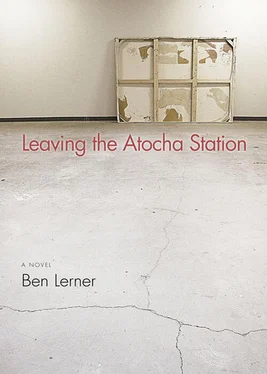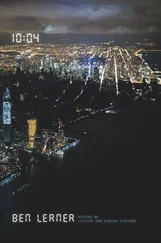Teresa had sat down beside us and lit another joint and passed it to me and asked me something and I heard myself respond but all that was very distant and what I heard her whispering was something like: To join lips to express affection or as part of insufflation. To click the teeth while making love or trying to form a seal between your mouth and the victim’s or to place the tongue between your teeth to pronounce the z of Zalacaín or to place a tooth beneath a pillow or the bracelet made of baby teeth her grandma had. To attempt to move from one language into another without rotation or angular displacement and to fail in that attempt and call your father from a pay phone weeping or to weep before a painting so one can think of pay phones and of paintings as the same. Now I realized Teresa wasn’t speaking but was humming and playing with my hair but still I heard: To embrace the tragic interchangeability of nouns and smile inscrutably or to find a way of touching down, albeit momentarily, and be made visible by swirling condensation and debris and to know that one pole of experience is always caught up in the other but to know this finally in your body, cone of heat unfurling. To take everything personally until your personality dissolves and you can move without transition from apartment to protest or distribute yourself among a shifting configuration of bodies, saying yes to everything, affirming nothing, your own body “giving up / Its shape in a gesture that expresses that shape.”
Then I was on my back and Teresa was on her back beside me and all of the jealousy was gone or so far away I no longer thought of it as mine. I could see a particularly bright star that I then saw as a satellite but ultimately I knew it was a plane.
I WAS IN NO POSITION TO EVALUATE HER TRANSLATIONS BUT I SENSED they were very good. When she read them to me I felt that she had carried a delicate, mirrored thing down a treacherous path, but what that thing was, I had no idea, and “path” isn’t really the word. Arturo had ceded the project entirely to Teresa. We had culled fifteen pages or so of what we thought were the better poems. I was flattered and mystified and made a little uneasy by Teresa’s apparently intense and sincere enthusiasm for my writing. Often when I slept at her place she would, instead of coming to bed with me, go to her desk and work, presumably on my poems. We never fucked or made love or had sex; I wasn’t sure why, but I associated that fact with the translations. And when she was smiling her inscrutable smile or attending to me with her uncanny grace, producing the match or coffee or phrase I wanted before I knew I wanted it, or when we were just walking around Madrid in silence, I felt she was observing me, observing me with interested detachment, ridiculous phrase, as if my behavior might hold clues for her regarding a resonance or inflection or principle of lineation. She never mentioned her own poetry.
In post — March 11 Madrid, I kept thinking things were going to explode; I would watch the planes making their way to Barajas and the sun would catch them briefly and I would believe for a second, with less fear than excitement, that they were aflame. Or I would take the Metro and experience a sudden jerk in the carriage as the first detonation. I would imagine my friends from the U.S., their amazement and maybe envy at the death I had made for myself, how I’d been contacted by History. Why I thought, why everybody thought, that dying in a terrorist attack was more bound up with the inexorable logic of History than dying in a car crash or from lung cancer, I couldn’t really say. I told Teresa that it derived from our impoverished sense of the political, that we could not think of the car or cigarette as Titadine because that would force us to confront our economic mode; when she said I sounded like Carlos, my face burned. Where is Carlos anyway, I asked her one afternoon as we walked slowly toward her apartment from La Filmoteca. We had seen two movies by Cocteau, the subject of a retrospective. It was one of the first hot days and the entire city, save Teresa, appeared sluggish. She said Carlos was in Barcelona, working. In my mind Carlos and Oscar, near anagrams, merged, and I had a sudden pang of longing for Isabel. I asked her what kind of work he did and she said, in English for some reason, “Organizing.”
“I have never been to Barcelona,” I said. The notion of Carlos “organizing,” I hoped she understood, was too preposterous to acknowledge.
“We can get there in a few hours on AVE,” she said, which was the high-speed train. I had thought it took much longer.
“Why, do you want to see Carlos?” I asked.
“We can go back to my apartment and get some clothes and go tonight, if you want,” she ignored me.
“O.K.,” I said, and we walked more quickly to the apartment, packed a few things, including, I saw, the notebooks of my poems and her translations, and then took a cab to Atocha to catch the next train. She bought the tickets because she bought everything and we walked past some red candles and boarded the train and after an initial jerk that I thought was an explosion we were speeding north, images from Cocteau’s Orpheus still flashing in my head. Three hours later we were in Barcelona. We walked from the station into El Barrio Gótico, labyrinthine, medieval streets largely closed to cars, and arrived at what looked like a fancy private residence but was in fact a small hotel. Teresa greeted a woman behind the tall desk and said something, to my surprise, in fluent Catalan. She gave her a credit card and we were provided an antiquated key. We ascended two flights of iron stairs and found our room. It had a giant wooden door, high ceilings, and the walls were white, so it recalled Teresa’s apartment. Teresa removed more clothes from her small bag than I would have thought possible and hung them in the closet. Why weren’t they wrinkled? We walked onto the balcony overlooking the street; it was only now dark.
She asked me what I would like to do and I said I was hungry; there was a restaurant she liked near the Sagrada Familia. We left the hotel, walked for a while, and emerged onto Las Ramblas. We took a cab to the Sagrada Familia, which was illuminated; it was the ugliest building I had ever seen. A few blocks away was the restaurant, Alkimia, full of fashionable people, and although it was crowded and we had no reservation we were immediately seated. I ordered a drink in Spanish and the waiter clarified my order in English, something that never happened in Madrid. Teresa ordered various small plates and they came quickly: tuna belly cut in the manner of Iberian ham and served over some kind of broad bean; white bread rubbed in oil and covered with tomato paste; a dish involving truffles and tiny pieces of sausage that might have been duck; it was all delicious. They brought us a bottle of white wine I hadn’t heard Teresa order and by dessert I felt pleasantly drunk. Dessert was a wonderful and unfamiliar ice cream and I asked the waiter what was in it and he said “Eucalyptus.” I was slow to recognize the gorgeous word as English.
After dinner we sat on a bench in a little park full of people and beneath a branching cast-iron street lamp a small wave of euphoria broke over me. Teresa let herself be kissed for a while and then we took a cab back to the outskirts of El Barrio Gótico and walked to our hotel and I thought we might make love. Instead we smoked another spliff on the balcony and I asked her how she learned Catalan. She said she had lived in Barcelona at various points, said it as if she were very old; Arturo had told me she was twenty-seven; she looked older and younger than her age in shifts. I said I would like to have a drink and we left again and after ten minutes or so we descended a few stairs into a bar that felt like a cave, cool and dark. We seated ourselves in green leather chairs in a corner around a little table that seemed to be made of petrified wood. A woman with an array of facial piercings appeared at our table and we ordered our drinks. Teresa asked me if I had seen the Antonioni movie partially set in Barcelona, The Passenger, and, lying, I said of course. She said I had his eyebrows, Jack Nicholson, that I called on my eyebrows to do important work, that if she were deaf she would read my eyebrows, not my lips. I said she was simply describing the personality of the translator, but I said it in my head. She said Arturo always claimed she looked like Maria Schneider, whom I knew from Last Tango in Paris, which I hated, and I could see what Arturo meant. I wondered what Maria Schneider’s relationship to Jack Nicholson was in The Passenger, what kind of statement Teresa was making about our relationship, and based on the Antonioni films I knew, I guessed it was unflattering.
Читать дальше












